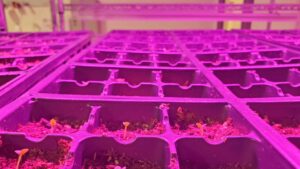Any country that wants to help feed the world and be competitive on the global stage needs to empower its farmers by putting variety development and delivery at the forefront of its agricultural strategy.
Farmers want to ensure better yields, economic stability of their farm, and make farming easier and less labour/input intensive. They do this through the use of improved varieties. Better varieties also opens up new market for those farmers, bolstering the export potential of what they produce.

Editorial Director, European Seed
Of course, to do any of this, farmers need access to high quality seed and suitable new plant varieties. Enabling this access is key to ensuring food security and economic development, including in developing countries.
According to Oxfam, over 80 million people currently do not have enough to eat. Around nine million people die every year of hunger and hunger related diseases. That’s 11 deaths per minute. This is more than the number of deaths from AIDS, malaria and tuberculosis combined.
So, what’s needed to ensure farmers have access to new varieties that meet market demands? A regulatory framework that encourages the development of innovative varieties and the production of and delivery of high-quality seed of suitable varieties to farmers.
Sounds simple, but is anything but. Crafting such a regulatory system that enables plant breeding innovation requires a global perspective that takes a number of things into account.
Modern regulatory frameworks must consider how indispensable plant breeding is.
They must enable breeding and reduce barriers to innovation, must encourage breeders to team up with farmers in the development of new varieties, and take into account that regulatory change is inevitable, thereby allowing the easy updating of said regulations with minimal red tape.
However, the modernization of regulatory systems requires the public to be on board. To facilitate this, industry must reach out to ensure it strengthen its relationships with those who use its products. Consumer education is important in order to build trust in new varieties. Traceability systems are crucial in helping do this. The seed sector and farmers must partner up to increase farmers’ capacity to use seeds in effective ways.
The benefits to society of variety development/plant breeding are many. According to the report Returns from Private Sector Seed Research from Iowa State University, society (mainly farmers) reap 75% of the total benefits. Farmers get a $6 benefit for each $1 spent on private sector research.
In the European Union, for every £1 invested in plant breeding, £40 in added value is delivered across the wider economy. This statistic, from the British Society of Plant Breeders report Economic Impact of Plant Breeding, takes into account higher yields and input savings at the farm level.
We have a growing world population that in about 30 years’ time will be close to 10 billion people. At the end of the century, well over 11 billion people will need to have nutritious and safe food. Over 800 million people around the world are undernourished.
On the other side of the bell curve, 640 million people are classified as obese. Nearly two billion people on the planet are overweight. In terms of food losses and food waste, the United Nations estimates that we’re losing around a third of all the food that is produced for human consumption.
Plant breeding can help mitigate all these challenges. More than ever, we need modern regulatory frameworks that put plant breeding and new varieties at the forefront and enable breeders to work with as few constraints as possible. Creating those frameworks requires all of us to think globally.
—Marcel Bruins is a consultant who received a plant breeding education from Wageningen University in the Netherlands and is editorial director for European Seed magazine.












